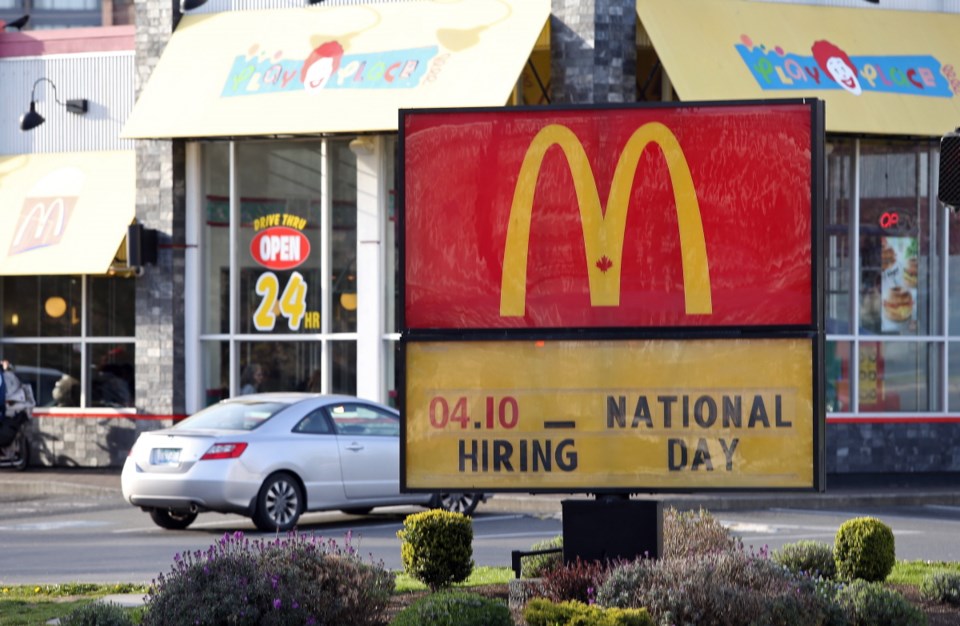 “There’s no doubt we’ve seen some abuses that really tick me off,” federal cabinet minister Jason Kenney said a few weeks ago.
“There’s no doubt we’ve seen some abuses that really tick me off,” federal cabinet minister Jason Kenney said a few weeks ago.
He was referring to the temporary foreign workers program and his irritation about the perceived abuses by that point had been growing for some time.
So when the situation at three Victoria McDonald’s restaurants was made public by the CBC, he was more than ready to respond.
The “ticked off’ minister has landed on the restaurant owner with both feet. The allegations that the franchise owner was ignoring local job applications in order to make the case that hiring from off shore was permissible prompted an immediate and full-on reaction from the federal government.
The franchisee, as well as two other restaurants in Ontario and Newfoundland, are now publicly identified on a government shame list as having their hiring permits revoked or suspended. Victoria immigration lawyer Robbie Sheffman said the moves were sudden and immediate, but the government has been building the groundwork for them for a few years.
It became clear over that time that there wasn’t much in the way of enforcement rules when it came to issuing labour-market opinions and allowing temporary foreign worker permits. And the issue was becoming increasingly sensitive, with revelations that the Royal Bank of Canada had displaced 91Ô´´ citizens to make way for new hires from outside the country.
So legislation was adjusted and ministerial discretion was broadened to allow for the kind of swift action that was on display last weekend. Governments are not normally known for instantaneous responses to problems. But the reaction to the Victoria McDonald’s restaurant issue was a marvel of speed.
Kenney learned of the issue last Thursday. Federal inspectors were on hand the next day. They got enough evidence in short order that Kenney issued a news release, on a Sunday no less, outlining the tough action being taken. The labour-market opinions, which allow for the permits to be issued, were suspended. All the permits in process were cancelled.
And Kenney himself charged the owner had used false, misleading or inaccurate information in order to hire from offshore. He also raised the possibility of court charges, for offences that carry penalties of jail time and fines of up to $100,000.
Only the week previously, Ottawa announced an upcoming bill to toughen the penalties for misuse of such permits. But Sheffman said the more stringent approach has been in the works for some time.
The local restaurant permits are suspended, pending further process. But there’s not much doubt the hammer has come down irrevocably. McDonald’s waded into the issue, suspending the franchise ownership and taking over the three restaurants as corporately owned outlets.
Sheffman said it was part of a process to beef up enforcement. The laws are tougher and “ministerial instructions” can now be used to send inspectors into workplaces without warrants.
“They’ve been working out and flexing their muscles,” he said. “Now they’re using them.”
He said the system is now so mandated with mechanisms geared to enforcement that it’s slowing down.
“Legitimate employers with real needs operate in a much slower environment. Cases are more difficult to expedite.”
All of which spells trouble for the B.C. economy. Temporary foreign workers are an indispensable part of the push for a mammoth new liquefied natural gas industry. There are already about 75,000 of them in B.C. and a lot more are expected.
The latest LNG update says thousands of workers will be needed as soon as 2017. And despite all the talk of ramped up training and local hires first, B.C.’s labour force “will simply not be able to meet the labour demand generated by the growth of the … industry.”
The plan now is to hire locally first, then from B.C., then from the rest of Canada. Foreign workers are a last resort, but there’s not much question they’ll be utilized.
And employers will have to make impeccable bulletproof cases there are no 91Ô´´s available before they can start the time-consuming process of hiring them.



